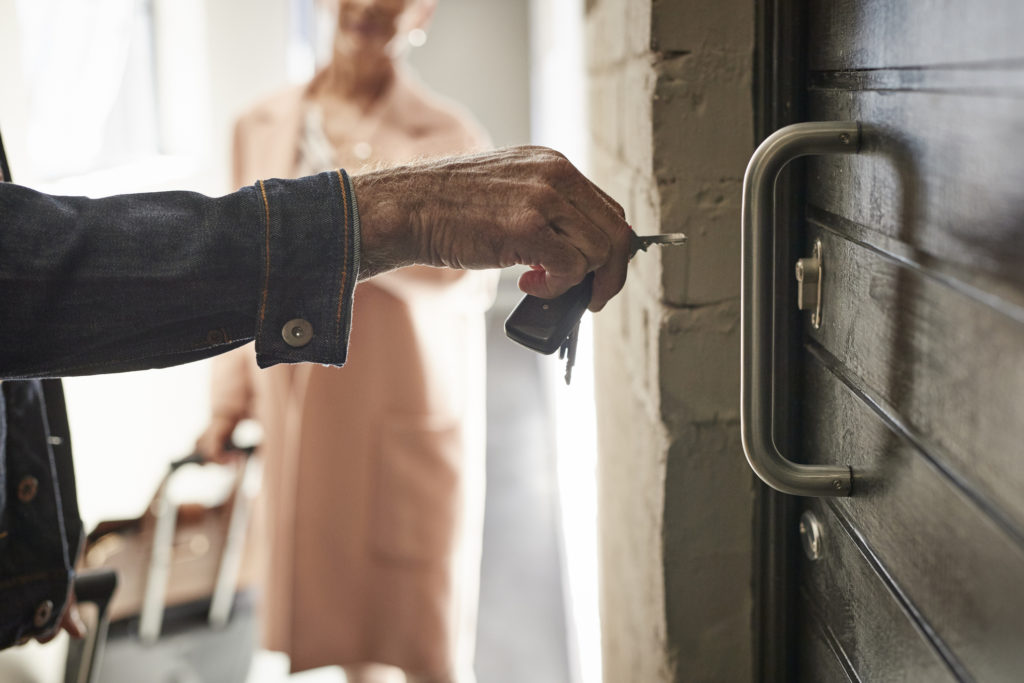Like owner-occupied homes and long-term leases, Airbnb rentals have neighbors. And those neighbors aren’t always thrilled to live near a short-term vacation rental property. Industry research consistently shows that short-term-rental neighbors worry about one thing more than any other: noise. In fact, neighbor concern about noise ranks higher than concerns about parking, trash, smoking or general safety.
When guest noise is a problem (and sometimes even when it’s not) neighbors are likely to complain. They may complain directly to the rental’s guests, or they may contact law enforcement or security to intervene. They may also lodge complaints with the rental’s property management company or owner.

However or wherever neighbors voice noise complaints about Airbnb rentals, these complaints can cause serious problems for STR owners and property managers. A vacation-rental guest who has been yelled at by an angry neighbor may retaliate with a negative property review on Airbnb. A neighbor complaint lodged with a city’s short-term-rental licensing department may result in hefty fines for the property owner. Repeat complaints may lead to revocation of the property’s short-term-rental permit altogether. In short, neighbor noise complaints can hamstring vacation-rental marketing efforts and deeply cut into short-term-rental profits.
But by taking a handful of proactive steps, short-term-rental property managers and hosts can prevent most, if not all, Airbnb neighbor noise complaints.
- Be honest with neighbors about short-term rental plans.
- Screen potential guests before accepting bookings, and book with care.
- Communicate “house rules” clearly in Airbnb listings, and attach penalties to violations.
- Install privacy-safe noise measurement devices inside and out to keep Airbnb neighbors safe from sound.
1. For starters, be upfront and honest with neighbors about short-term rental plans.
Nobody likes to feel caught off guard or left in the dark. So don’t let your short-term vacation rental be a surprise to neighbors. Communicate to your Airbnb neighbors that your property is being rented out as a vacation accommodation. Express that you are invested in the neighborhood. Let them know you care about the security and comfort of the people who live next door to or near your Airbnb rental.
List out the steps you are taking to ensure that guests are quiet, well behaved and respectful (guest vetting prior to booking, house rules that must be followed, remote noise monitoring). You may even consider offering your Airbnb property to neighbors’ own visitors at a special “friends and neighbors” rate. And, of course, make sure your neighbors can get in touch with you immediately if they need to.
If your short-term vacation rental property or properties are managed by a professional property management company, find out how the company notifies neighbors of new STRs adjacent to them. Ask how they respond to neighbor noise complaints. Find out how you can expect to be informed about complaints. Get their complaint-response policy in writing, including liabilities and exclusions.
2. Take the time to thoroughly screen potential guests before accepting bookings, and book with care.
Fortunately, guest vetting services and smart Airbnb sleuthing make this step fairly easy. Before accepting a booking through Airbnb, look at the guest’s rental history. Read the potential guest’s reviews. Are they consistently positive? Do previous hosts describe them as quiet and friendly? Good communicators?
The simplest way to avoid Airbnb neighbor noise complaints is to rent your property to guests who are unlikely to make excessive noise. This means guests with an established short-term-rental history and positive reviews from previous hosts. It also means enforcing occupancy limits. You may also consider requiring multi-night minimum stays, especially on holiday weekends and during events.
Reliable, experienced short-term-rental property management companies typically have strict guest vetting policies. Since property managers are responsible for maximizing nights booked and minimizing unanticipated expenses, they focus on getting positive reviews, and preventing noise-related penalties and damage.

3. Communicate “house rules” clearly in Airbnb listings, and attach penalties to rules violations.
Airbnb, Vrbo and other booking sites have “house rules” sections on property listings that you can customize. Customizable fields generally include maximum occupancy (don’t rent a two-bedroom condo to a group of 10). They also include fields for special events (where you can prohibit parties and events) and minimum stay (two nights or more are recommended for holidays, festivals, concerts and events).
Letting guests know they will be charged penalties for violating house rules is a great way to prevent noise, and neighbor noise complaints. These rules, and reminders about penalties, should be included in booking and pre-stay correspondence, and be on display at the property.
4. Install privacy-safe noise-measurement devices both indoors and out to keep Airbnb neighbors safe from sound.
Being able to remotely monitor noise gives short-term-rental property owners and managers greater power to prevent complaints and damage. Privacy-safe noise devices measure decibel levels and duration of noise. They do not identify specific sounds or record sounds. These devices can easily be installed during a cleaning turnover between bookings. Once installed, they can be monitored via mobile app or website. Guests are reminded via text message to take it down a notch if things get too loud. Most of the time, this gentle reminder takes care of the noise problem without neighbors being bothered, or getting involved. Industry research has shown that a single night of rental not protected by privacy-safe noise protection can lead to unplanned costs of up to $2,500.
Noise monitor data can also help property managers and owners defend against false noise complaints. Let’s say that a neighbor complains that a nearby Airbnb rental is the source of constant noise, simply because they don’t want a vacation rental in their neighborhood. Decibel data measured by a noise sensor can help prove that excessive noise did not, in fact, take place. This documentation can mean the difference between expensive fines or a revoked permit, and enjoying the benefits of well-reviewed, well-maintained, profit-generating investment property.
Some cities and counties actually require noise monitors to be installed in order to obtain a short-term-rental permit. Even if not required by ordinance or permitting rule, a privacy-safe noise detection device is an excellent tool to protect property, rental profits, and neighbors’ rights to a quiet neighborhood and a peaceful night’s sleep.